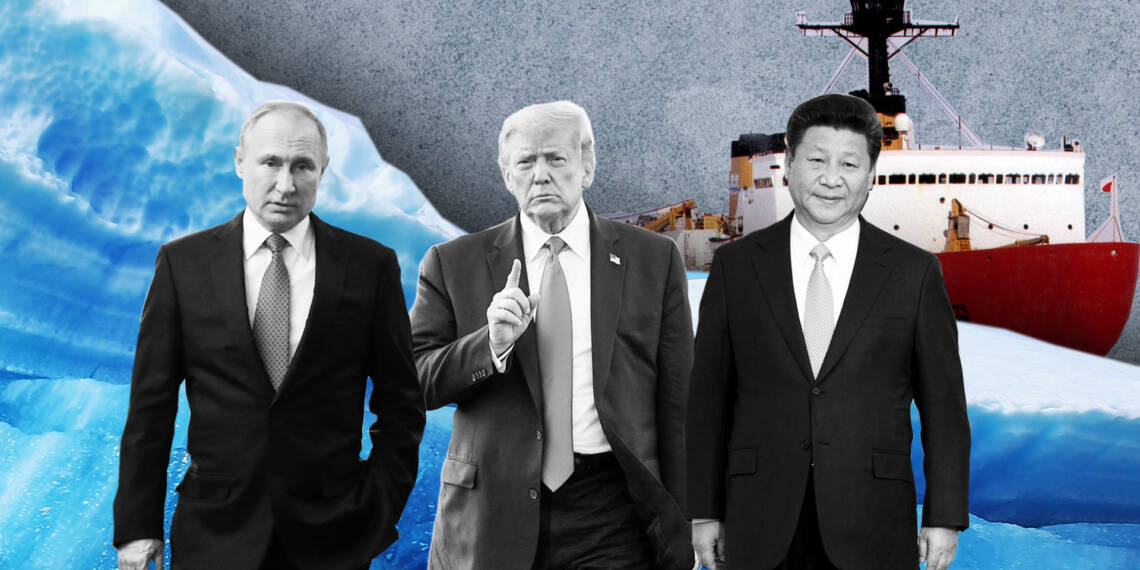The race for control and geopolitical one-upmanship continues as global powers vie for favorable geostrategic positions. In this context the Arctic region is fast becoming a hotspot for global powerhouses to hitch their flags. Russia, US, EU, China and the Nordic nations are all angling for control in the region.
What makes the Arctic so lucrative? Well, as the polar ice caps melt away, nations have begun to engage in a modern gold rush over the region’s unclaimed territory, natural resources, and strategic position. It has also resulted in an increase in unclaimed ocean and land territory, beyond any nation’s control, that countries are attempting to gain jurisdiction over for purposes such as resource extraction and trade routes.
A 2018 National Aeronautics and Space Administration report estimated that the Arctic has lost 21,000 square miles of sea ice per year in the last five decades, opening up more territory on the narrowing strip of land for controlling and cultivating.
Control over Arctic territory has given nations the ability to settle it, extract resources, and establish military outposts, making legal rights and claims over such territory incredibly valuable. Most legal matters concerning the region are determined by the Arctic Council: an intergovernmental organization that encourages cooperation in the region. Its key nation members are those that border the Arctic: the United States of America, Russia, Canada, Finland, Sweden, Denmark, Norway, and Iceland. Currently, Russia and Canada have claimed the most land in the region.
Beyond the eight neighbouring countries, there are also thirteen observer countries affiliated with the Arctic Council, such as China, Germany, and India. The difference in roles between member nations and observer countries, in many cases, can be seen in their stated reasons for being in the region.
With the growing race for the rare resources and geostrategic positioning in the region all these nations are now competing on who can get hold of more from the Arctic.
The competition over land claims is driven in part by nations’ desire for the region’s natural resources, specifically natural gas, which provides almost a quarter of all global energy usage. Most natural gas supplies around the world have already been explored and exploited, but the Arctic presents a vast untapped reserve over which nations are vying for control. A US Geological Survey estimates that the region has 1,699 trillion cubic feet of natural gas and various other fuels, equal to the entirety of Russia’s oil reserves and three times as much as those of the United States.
Nations push their stake in the Arctic.
The USA under Donald Trump is now even more keen on getting a strong foothold in the region. It is also a part of the reason why Trump has been pushing so aggressively with his Greenland and Canada agendas, as both regions have a huge stake in the Arctic.
The Chinese Government has dubbed their involvement in the Arctic region as the “Polar Silk Road,” which is an allusion to the trade routes that they intend to pursue following the acquisition of natural resources. China’s legal claim to the region differs from many other nations due to its lack of a land border to the Arctic, complicating its efforts. Although it has not stopped Beijing from claiming its stake through investments in several companies currently operating or looking to operate in the region.
Meanwhile, Russia has its designs in the Arctic, maintaining its military presence through its numerous airbases and border outposts. Russia has recently flaunted its military might in the region through its August 2019 Ocean Shield Exercise, demonstrating its capability to conduct military operations in the region and to deter other nations from interfering. This has spurred the United States to revitalize its presence in the region. Currently, the US has one airbase, the Thule Air Base, located in northern Greenland. In 2017, the United States invested US$40 million in improving the Thule Air Base due to Russia’s escalation of military presence in the region. The Air Base’s location is uniquely strategic, given that it sits at almost the exact midway point between Washington DC and Moscow. The implications of the Thule Air Base for conflicts outside of the Arctic cannot be understated, as it could detect any incoming missile from Russia, North Korea, or China.
Also read: Trump and Putin come together for an Arctic conquest
The US-Russia dynamic in the Arctic Circle region is reminiscent of the Cold War, and while the two militaries have not come into direct conflict, their constant parade of military exercises and increasing military investment in the region set the collision course for a conflict that might erupt, especially as the territory is rapidly decreasing in land mass.
As we can see, whether it’s oil or other rare resources, whether it’s the claim over new trade routes or it’s an opportunity for a crucial geostrategic position, the Arctic is fast becoming a major battleground for the global powers to compete and dominate. With China, Russia, and the US all vying for a prime position and nations like France, India, and Germany looking to have their stake, the Arctic geopolitics are bound to get even more complicated in the future. The world can only hope this race does not trigger a more major global clash although the ingredients for it are all present.








